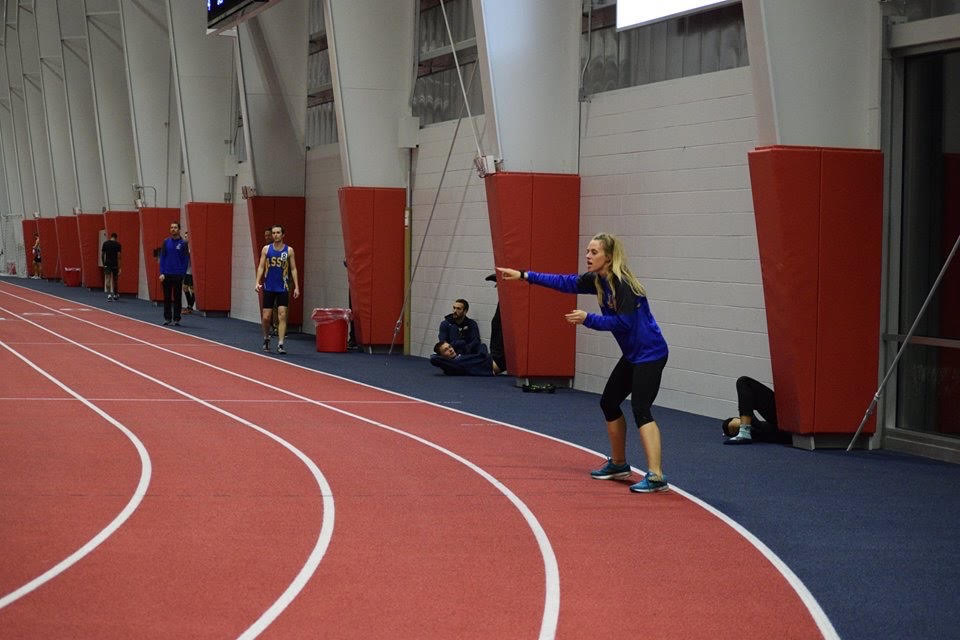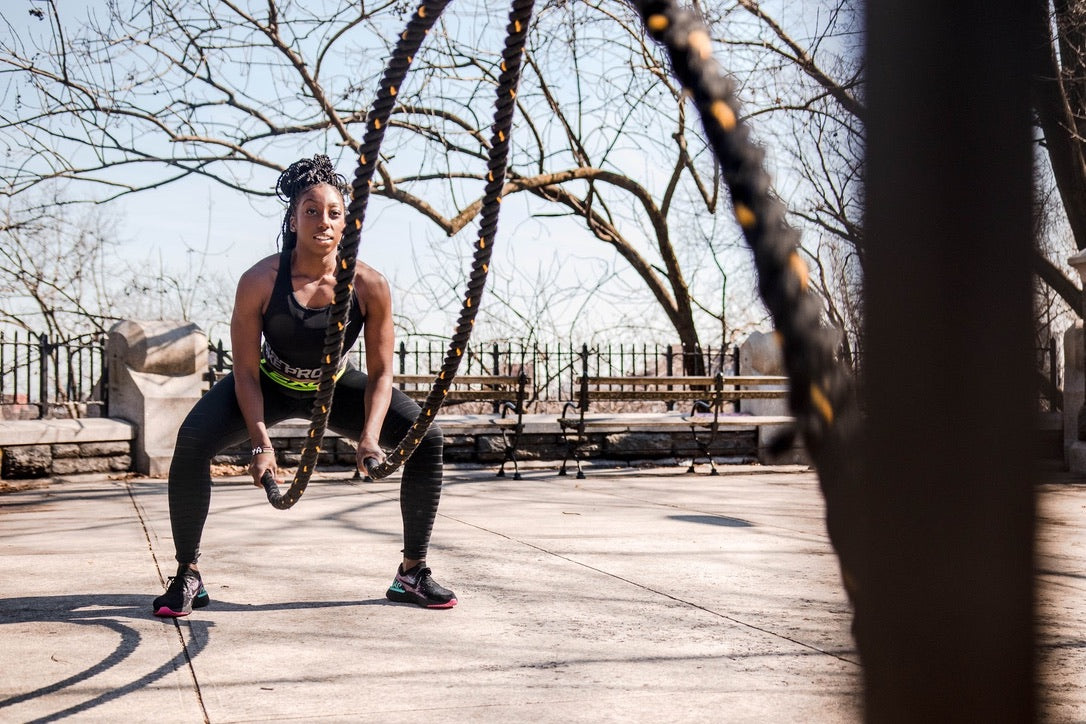In The Future is Female Coaches series, we’re celebrating the women of our sports who are leading, inspiring, and making us all stronger. Every week we’ll be featuring interviews with female coaches about their experiences and insights working across a variety of aspects and disciplines within the running and fitness space.
This week we’ve interviewed Alison Staples, the 5K and 10K coach at Charm City Run and current Half Marathon and Marathon coach for the Maryland chapter of Team in Training. Alison came to running as an adult and found that in addition to fitness, she was also building friendships and a commitment to the sport as she logged her training miles. She now brings her experience, enthusiasm, and perspective to the runners she coaches and to her teammates on the R.I.O.T. Squad in Baltimore, Maryland. You can follow Alison on Instagram at @alioop_0_o_runs.
How did you get your start in the sport? How have your involvement and interests changed over time?
I was not a runner by any stretch of the word. I was strictly an elliptical user. I had a good friend, a black woman, who ran marathons. I thought she was crazy but I secretly admired her for doing something I had never seen a black woman do. She convinced me to train for and run a half marathon. The experience was grueling, time consuming, and painful, but crossing the finish line gave me the biggest feeling of accomplishment. It’s a feeling I live over and over again every time I hit the pavement. Since then, I’ve grown to love the community and friendships I’ve gained from running. My involvement and interests are more group-oriented and people-connector based. My love for the sport has allowed me to connect and share experiences with runners from all backgrounds, while also allowing me to be the friend to another black woman that my friend was for me.

What inspired you to start coaching?
I ran my first marathon and my training paces didn’t equate to my finish time on race day. I was running with a group on the weekends for long runs, but wasn't running much during the week. I wasn’t following a training plan, I was just meeting them for weekend runs, and running when I felt like it during the week.I didn’t understand anything about the importance of increasing mileage, fueling, strength training, etc... I got certified with the intention of only becoming a better runner for myself, I had no intention of coaching other people. I didn’t consider myself a good enough runner to coach anyone. Once you pass an exam and become certified, your name gets put into the RRCA coaching database. A representative from Team In Training (endurance charity for program Leukemia and Lymphoma Society) reached out to me about a head coach position for the state of Maryland and although I had never coached a single person, and still didn’t believe in my own capabilities, I said yes. I had an uncle who passed away from Non Hodgkins Lymphoma and I looked at this as a gift from him. One of the best pieces of advice I got from a friend was “say yes now, figure it out later.” And that is how I tackle most of the things I want to do that I’m passionate about. Agreeing to coach that season was life changing, and one of the best life decisions I’ve ever made.
Did you have any coaches in your athletic history who particularly shaped your experience of the sport or impacted your own approach to coaching?
Honestly, the runners I coach push me to be a better runner, and ultimately a better coach. The new runners who “hate running” challenge me to think of ways to make running more enjoyable, the runners who are burnt out from multiple races challenge me to get them excited about running again, the runners who don't consider themselves runners force me to give them the same daily doses of confidence I give myself. I’ve been coached before, but the lessons I learn from my own athletes shape my approach to my coaching philosophies.

What drives you as a coach and a leader in the running space? What impact do you most hope to have?
As a coach and a leader in the running space, I’m most driven by the enthusiasm of others for the sport. Running has this gift of equalizing and humbling us. From my work in treating patients with spinal cord injuries to my work as a run coach, I have seen and can empathize with the full human spectrum of emotions as it applies to physical movement. This gives me the opportunity to connect and motivate people on the basic principle that all movement is a gift. I aspire to give those around me the notion in realizing that running is a gift, and we are free to give it to ourselves and others as frequently and as passionately as we choose. I hope that when it’s all said and done, I’ll have inspired someone to believe in themselves, on the road and off.
The tagline for R.I.O.T. Squad, your running club in Baltimore is 'Running is Our Therapy.' How do you use running to create a supportive community for your members?
The founder of the group used running as a way to manage his PTSD after discharge from the army. He asked his friends to join along and thus R.I.O.T squad was formed. I joined the group shortly after it was formed. We use running as a safe space to talk about issues in our Baltimore community. We engage in mindfulness practices such as yoga, and we hold discussions on the importance of therapy, journaling, and maintaining fitness as a way to decrease stress and anxiety, and hold each other accountable on our goals.

What are the biggest barriers or challenges you see in making distance running more inclusive at a grassroots level? What steps can coaches and runners take to change this?
There are a lot of barriers/challenges in distance running that have contributed to the lack of representation at the amateur grassroots levels. Running shoes designed specifically for distance and speed are expensive, nutrition such as gels, or even an inflated grocery bill during heavy months of marathon training are another expense many runners may not have access to. Race fees are expensive, time spent training for races takes away from time that could be spent working or handling family obligations. Unfortunately there’s not much runners or coaches can do to mitigate the expenses sometimes occurred with racing, but I think returning back to normalizing running without needing to race is a great start. You don't need to race to run. You don't need a medal to run 13.1 miles. I think if coaches and runners focus more on the intrinsic rewards of running, it would shift the culture from racing to running. Many of us are struggling right now without a race on the calendar but there’s something equalizing about running without the pressure of FOMO of racing.
What is your coaching philosophy?
Person first always--I want to know what makes my athletes tick. What they’re unsure about, what they lack confidence in, what their major problems are, what they love about running, what they find the most challenging. Runners who need coaching don't need just another training plan. They need someone who cares about the hours spent outside of running as well.

What areas of the sport have most evolved or improved in the time you’ve been involved?
Fields are a lot faster. Take for instance the Boston Marathon qualifying time. In order to stay within field capacity size, qualifying times are becoming faster due to a growing popularity in the sport, advances in shoe technology, and just faster runners. The field size of women participants is steadily increasing. I ran the TransRockies Series (a 3 day 60 mile or 6 day 120 mile trail race) last year, and for the first time in history the majority of runners were women. Run crews are growing in all major cities. It’s exciting to see the grit of street running and camaraderie between run clubs connect people all across the globe.
What changes in the sport are most vital to make it more inclusive and accessible?
Representation. It's important that underrepresented groups continue to show up in spaces where there are few or none. It’s important that underrepresented groups demand visibility, and in certain circumstances accommodations. I have the pleasure of working with an incredible hand cycle team of para athletes, and one of the non-negotiables we have when racing is a start time a few minutes ahead of lead runners. Not only does this give the team visibility, it also ensures safety for all race participants. Athletic brands should be encouraged to hire C level executives of color. Real change occurs from within. Media coverage is also vital in order to make the sport more inclusive and accessible. Whether it be magazine publication covers, or more TV coverage of persons of color at large races (i.e. Olympic qualifying races), it's imperative all groups are represented in the sport of running.


